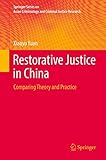Restorative Justice in China [electronic resource] : Comparing Theory and Practice / by Xiaoyu Yuan.
Material type: TextSeries: Springer Series on Asian Criminology and Criminal Justice ResearchPublisher: Cham : Springer International Publishing : Imprint: Springer, 2017Description: XXI, 212 p. 3 illus., 2 illus. in color. online resourceContent type: text Media type: computer Carrier type: online resourceISBN: 9783319639222Subject(s): Asia -- Politics and government | Political sociology | Criminology and Criminal Justice | Asian Criminology | Asian Politics | Political SociologyAdditional physical formats: Printed edition:: No titleOnline resources: e-book Full-text access
TextSeries: Springer Series on Asian Criminology and Criminal Justice ResearchPublisher: Cham : Springer International Publishing : Imprint: Springer, 2017Description: XXI, 212 p. 3 illus., 2 illus. in color. online resourceContent type: text Media type: computer Carrier type: online resourceISBN: 9783319639222Subject(s): Asia -- Politics and government | Political sociology | Criminology and Criminal Justice | Asian Criminology | Asian Politics | Political SociologyAdditional physical formats: Printed edition:: No titleOnline resources: e-book Full-text access | Item type | Current library | Collection | Call number | Copy number | Status | Notes | Date due | Barcode |
|---|---|---|---|---|---|---|---|---|
| E-Books | MEF eKitap Kütüphanesi | Springer Nature | XX(1420342.1) (Browse shelf (Opens below)) | Available | NATURE | 1420342-1001 |
Browsing MEF eKitap Kütüphanesi shelves Close shelf browser (Hides shelf browser)
Introduction -- Part I.-Introducing the Topic -- 2.Conflict Resolution in China: Cultural Then Political?- 3.Criminal Mediation in Chinese Criminal Justice Context -- Part II: Discovering Realities: A Naturalistic Qualitative Inquiry -- 4.Discovering Realities: A Naturalistic Qualitative Inquiry -- Part III: Empirical Findings -- 5.Case Summary and Description-Based Case Studies -- 6.Thematic Analysis -- 7.What is the Harmony Approach?- Part IV: Doing "Restorative" Justice: China and the West -- 8.Restorative Justice -- 9.Restorative Justice Practices: The Restoration Model -- 10.A Dialogue Between China and the West on Doing Restorative Justice -- 11.Conclusion -- References -- Appendix -- Index.
This book provides insights into the history, development, and practice of restorative justice methods in China. Traditionally in China, mediation has played an important role in criminal proceedings, which has many characteristics in common with the "Western" concept of restorative justice. Through case studies and theoretical examination, the author of this timely work aims to bridge the research on restorative justice models mainly developed in the West with restorative justice as practiced in China. After a Brief overview and introduction, the author compares and contrasts case studies of restorative justice-like practices from different districts in China. The author examines cases studies from several regions within China, and explores the key question: can the restoration model developed in the West take root in China, and if so what legal, cultural and societal accommodations may need to be made? This work will be of interest to researchers in Criminology and Criminal Justice, particularly with an interest in alternative justice practices, restorative justice, and international comparative criminology; as well as researchers interested in Chinese affairs or Asian Studies. .
5







